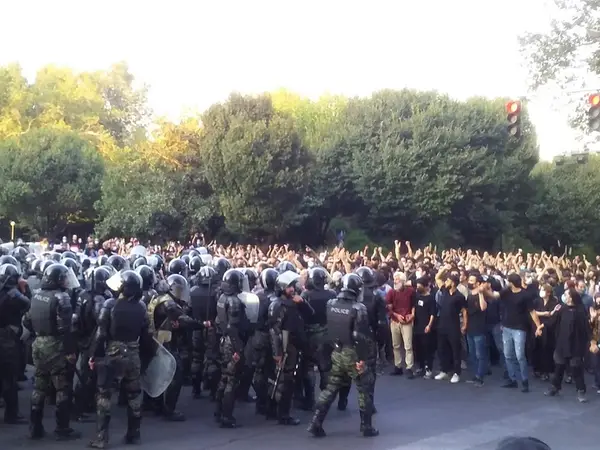An opinion survey involving 158,000 people in Iran showed that more than 80 percent of respondents reject the Islamic Republic and prefer a democratic government.
The Netherlands-based Gamaan institute conducted the survey from December 21-31, which also included a sample of 42,000 respondents in the diaspora, revealed very similar attitudes between those in the country and abroad.
“In response to the question “Islamic Republic: Yes or No?” 81% of respondents inside the country responded “No” to the Islamic Republic, 15% responded “Yes,” and 4% were not sure. Of the Iranian respondents abroad, 99% responded “No,” opting against the Islamic Republic,” GAMAAN reported.
In a follow-up question for those who answered “No”, the survey asked about their preferred democratic and secular alternative political system. Of those, 28% inside Iran and 32% outside Iran would prefer a presidential republic, 12% inside Iran and 29% outside Iran would prefer a parliamentary republic, and 22% inside Iran and 25% outside Iran would prefer a constitutional monarchy.
In a press release shared with Iran International, GAMAAN explained that "This survey was conducted online using a specialized and secure platform." Given the inaccessible nature of the country, Gamaan used a special online tool to reach respondents in Iran through diverse channels, to eliminate chance of selective targeting and include as much of a representative sample as possible.
But GAMAAN does explain that it “uses digital tools and different methods to extract the (real) opinions of Iranians about (sensitive) social and political topics. The rationale for GAMAAN’s innovative approach is the fact that conventional survey methods cannot yield valid results in the existing Iranian context.” It also ran reliability comparisons with available data and other surveys.
Regarding the antigovernment protests since mid-September, 80% of those inside the country support the movement; 67% believe the protests will succeed, while 14% think they will not succeed. Around 15% of the population inside the country oppose the protests. Respondents outside the country overwhelmingly support the protests; of these, 90% think they will succeed, and only 9% think they will not succeed.
Responses to multiple questions confirm a general view shared by many observers that the clerical regime in Iran enjoys a 10-15 percent support in the country.
While 60 percent of respondents inside Iran describe themselves as proponents of regime change as a pre-condition for any meaningful change, only 6 percent support gradual reforms and 11 percent support the principles of the Islamic Republic.
Another result that confirms reporting by Iran International and others was the lack of support for Iran’s football (soccer) team in the 2022 World Cup. About half of the respondents in Iran and abroad “state that they feel happy that the soccer team of the Islamic Republic of Iran lost against the United States’ team. In contrast, 23% of those in the country and 8% of those outside report having felt sad about the game’s outcome.”
The survey revealed that 85 percent of respondents in Iran who support the protests agree with the formation of a so-called solidarity council, or opposition council comprising prominent activists of various political orientation to assume the leading role in the campaign against the Islamic Republic. Nearly 60 percent expect the council to form a transition council and a provisional government. Respondents name around 20 prominent figures in Iran and abroad as candidates for this council.
Prince Reza Pahlavi, Ali Daei, Ali Karimi, Hamed Esmaeilion, Hossein Ronaghi, Nazanin Boniadi, Fatemeh Sepehri, Masih Alinejad, Nasrin Sotoudeh, Toomaj Salehi, Narges Mohammadi, Molavi Abdolhamid, Golshifteh Farahani are the top candidates picked by respondents.
Remarkably, 73 percent inside the country believe that Western countries should defend the protestors’ rights by seriously pressuring Tehran. Of the Iranian respondents outside the country, 96% support this view. In contrast, around 19% of respondents inside the country think that Western powers should not intervene, as the protests are an internal matter.
Also, “a majority of 70% agree with Western governments proscribing the Islamic Revolutionary Guard Corps (IRGC) as a terrorist organization, expelling the ambassadors of the Islamic Republic, allowing international foreign intervention to protect protestors, sanctioning officials who played a role in suppressing the protests, and seizing Iran’s property and assets to cut the government’s access to them,” Gamaan says.
Note: In the original version of this article, a mistaken statement was published saying that the methodology of the survey was not fully clear. After further investigation paragraph 5 was amended.
